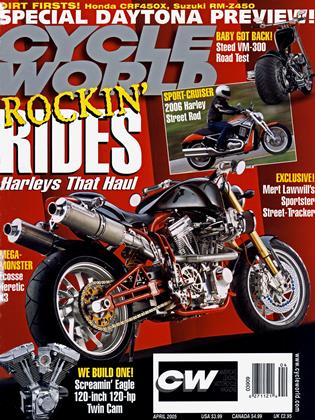Mert Lawwill
On Any Funday
Henry Ford made his name building race cars and when he built faster than he wished to drive, he hired a daring bicycle rider, fellow named Barney Oldfield, and together they made history.
Years later, the two elderly legends were on a podium accepting some honors, so the story goes, and Ford turned to Oldfield and said, “Barney, I made you and you made me,” to which Oldfield replied, “Yes, and I did a damn site better job.”
There’s a lot of Henry-and-Barney in the history of Bruce Brown and Mert Lawwill, the major difference being that both men began with good material and they both did a good job.
Brown was an established documentary filmmaker-see Endless Summer for proof-so when he decided to make On Any Sunday, a motorcycle movie, he enlisted actor/gearhead Steve McQueen for financial backing and Malcolm Smith and Lawwill to, as the current saying has it, speak truth to power; that is, let people know what motorcycles and racing were ail about.
Smith provided stupendous natural talent and an unquenchable grin. Lawwill displayed talent, plus grit to the level of last man standing, and he had an inquiring mind, always wondering how things worked, and how they could be improved.
His racing history is conventional. He simply took to motorcycling as a kid, attracted attention and backing and earned his Expert license. In 1963, he switched from BSAto Harley-Davidson and signed on with Dud Perkins, the San Francisco Harley dealer and retired racer. With help from men like Jim Beiland, whose frame made H-D’s 250cc Sprint into a short-track winner, and with backing and parts from the factory, Lawwill won the national championship in 1969, the last year of the 500cc ohv vs. 750cc sidevalve; then lost the No. 1 plate in 1970, the first year for legal rear brakes on dirt-tracks and the first year of the stopgap ironhead XR750. Even the Navy doesn’t have words to describe Lawwill’s everseething disappointment with that project.
Significantly, the fragility of the first XR is about the only thing Lawwill ever gets mad about.
He raced in a time of transitions. Brake and brakeless bikes use different cornering lines, which crossed, and lots of guys got hurt, Lawwill three times in one season.
Factory backing meant parts and sometimes expense money, but the factory often shared Mert’s improvements with other Harley racers, all of which made it a tough way to earn a living.
Lawwill won 15 Grand National races-short-track, TT, half-mile and mile-but for mostly niggling reasons, a cable snapped or a silly spill, he never won a roadrace.
He got off the bike but didn’t retire. Instead, he ran teams with riders like national champions Ricky Graham and Mike Kidd, and partners like Kenny Roberts.
Son Joe went bicycle racing but instead of wondering where he’d gone wrong, where he’d failed, Mert designed and built better mountain and BMX bikes, and is as well-known in that field as he is in motorcycling.
Through all this, he’s as low-key, cheerful and unassuming in 2005 as he was back in 1970, brisk and hard working, and although there’s a scrapbook on the table someplace, he’s more concerned with tomorrow’s schedule.
Bottom line: On his excellent website there’s a photo of the group at home and yes, comments Lawwill, it’s the same Tiburón house as we see in the movie.
Of course, he’s remodeled since then. -Allan Girdler
 View Full Issue
View Full Issue
More From This Issue
-
 Up Front
Up FrontProper Choppers
April 2005 By David Edwards -
 Leanings
LeaningsSustainable Trailer Towing
April 2005 By Peter Egan -
 TDC
TDCApples & Crocodiles
April 2005 By Kevin Cameron -
 Departments
DepartmentsHotshots
April 2005 -
 Roundup
RoundupRiding the Yamaha Mt-01
April 2005 By Damon I'anson -
 Roundup
RoundupDream On
April 2005 By Brian Catterson







